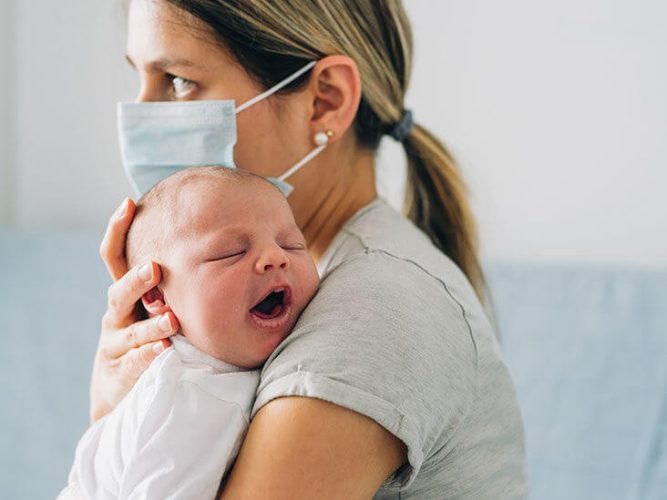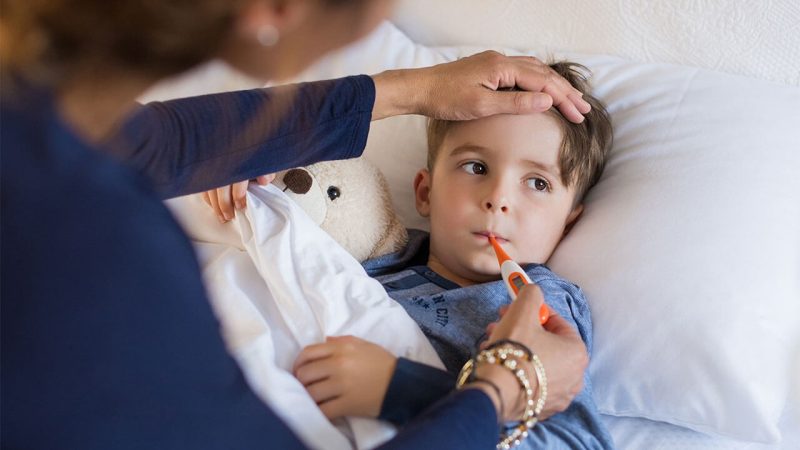With the second wave in India has shown an unexpected surge in the number of coronavirus (covid-19) cases, it has made us all the more cautious for ourselves and our family members, especially our kids. Earlier, during the first wave of this global pandemic, adults were at higher risks of getting infected with this virus. But during the second wave, a gene mutation has been noticed in the novel coronavirus (covid-19) which is now affecting children health below 18 years as well. With such a risk to their health, it is essential to understand all the COVID-19 symptoms in babies and children along with the pointers to help them recuperate into healthy lifestyle beings.
1. Are kids at a higher risk of getting coronavirus?
With the new strain of coronavirus (covid-19) that is causing the uphaul in the number of cases currently, both kids and adults alike are at risk of getting infected. In 2020, the first strain of coronavirus (covid-19) was more harmful to adults and caused only a few cases, that too asymptomatic, in babies and children. But with the new mutation, COVID-19 symptoms in babies and children are also mimicking the severe corona symptoms that were earlier seen in adults only.
2. Why were children health affected differently earlier?
Since most of the symptoms of coronavirus (covid-19) were flu-like and children health get more infected with flu throughout the year rather than the adults, it was assumed by the scientists that their body gave them better protection against the virus. But the new mutation seems to have overridden their immunity and is affecting them severely as well.
Also Read: How to talk to your kids about COVID-19?
3. How is coronavirus (covid-19) affecting the babies?
The newborn babies and babies under two years can also develop coronavirus during delivery or by coming in contact with a sick caregiver. This is happening as their immune system is not yet developed properly and they also have smaller airways. Most of their systems are to be developed as they grow. The smaller airways and lack of immunity put them at a higher risk of getting infected and developing severe respiratory diseases.
If you have just given birth, whether you are sure or unsure about your symptoms, make sure you take all the precautions while taking care of your newborn baby. If your symptoms are severe, you might have to be kept separately from your newborn baby until you are healthy again. Talk to your doctor and take all the precautions to make sure that your newborn baby is healthy.

4. What are the symptoms that parents should look out for?
The COVID-19 symptoms in babies and children might be milder than the adults. They may carry the virus load for a long time but might get rid of the symptoms in one to two weeks only. Even though the symptoms in different babies and children might manifest differently, here are some of the symptoms that parents should keep an eye on.
- Runny nose or congestion in the nose and chest
- Sore throat
- Fever and chills
- Excessive shaking
- Fatigue
- Gastrointestinal issues
- Loss of appetite or improper eating/feeding
- Headaches
- Bellyaches
- Diarrhea
- Nausea
- Vomiting
- Loss of taste and smell
5. What is Multisystem Inflammatory Syndrome?
The multisystem inflammatory syndrome in children (MIS-C) is a condition in which some of the major organs of the body – heart, lungs, kidney, blood vessels, digestive system, brain, and skin – get severely inflamed. MIS-C has been noticed as one of the post-COVID syndromes as the majority of the children who were affected with coronavirus (covid-19) in the past seem to develop this condition. The symptoms of MIS-C include:
- Fever that lasts more than 24 hours
- Nausea and vomiting
- Headache, dizziness
- Swollen lymph nodes
- Diarrhea
- Rashes on the skin
- Redness in the eyes
- Redness and swelling in the tongue and lips
- Increased heartbeat and rapid breathing
Some of the severe MIS-C symptoms include:
- Inability to wake up or stay awake
- Severe pain in the stomach
- White, blue or grey skin, lips, tongue, nails
- Confusion
- Difficulty in breathing
When you see any of the severe symptoms, take your child directly to an emergency room to the nearest hospital.
6. What to do when your child tests positive?
When you see the first COVID-19 symptoms in babies or children, the first step is to isolate the child. For small children health, it is difficult to isolate them in a separate room for a longer duration. But parents can take extra precautions like double masking, wearing a PPE kit or visors along with the mask. The key to fighting coronavirus (covid-19) is taking precautionary steps as soon as the first signs appear.
Is there a coronavirus (covid-19) vaccine available for babies and children?
Currently, there is no vaccine available for babies and children. Vaccines are available for 18+ adults only. Though scientists have started studying the effects of vaccination on children health and we can hope that some immunization treatment might be available in future.
Also Read: Tips For Parents To Stay Calm During COVID-19
7. How do I keep my children safe?
There are several steps that you can take to keep your children safe and sound.
- Wash your hands regularly with soap and water for a minimum of 20 seconds, regularly and more often. The sanitizer that you are using, make sure that it has more than 60% alcohol content. You can teach some poem or ask them to sing the Happy Birthday song twice so that they learn to wash their hands for 20 seconds at least. Show them a proper way to wash their hands thoroughly, in between the fingers and thumbs as well.
- Cover your nose and mouth when you/they sneeze. Ensure that you immediately throw away the used tissue. Don’t forget to wash your hands afterwards.
- Ask your kids to wash their hands after using the washroom. They must wash their hands before and after eating food as well.
- Inside your home as well, maintain social distancing. Ask your kids and family members to maintain a distance of about 6 feet while being inside the home.
- Restrict the in-person play dates with other children or involvement of kids in activities that include shared pieces of equipment. Encourage them to stay in touch with family in friends via video calls and phone calls. Organize virtual meet-up and family game nights to engage them.
- Ask your child to wear a cloth mask when they are around people. Do not place a hard mask on children’s faces, especially on kids below 2 years of age, if they have any breathing problems.
- Clean and disinfect your home every day. Disinfect the most touched and used areas and surfaces like tables, play stations, study table. Wash the toys of your child, especially the ones they put in their mouths, with soap and water. Clean the surfaces that they might tough like diaper station, edges of the crib etc.
- Keep your child’s immunization and vaccination calendar up to date. Many doctors are seeing children who are COVID-19 positive and negative separately, in a different location as well. Make sure you make a proper appointment with the doctor to avoid waiting with others.
The Bottom Line
It is essential for parents to understand that while there are many researchers who are working to create a vaccine to combat the COVID-19 symptoms in babies and children, this vaccine would not be available at least before 2022. To ensure that your children health are not affected, follow some of the above mentioned steps. The most important thing that you can do right now is to get yourself and all the other eligible members vaccinated at the earliest.

